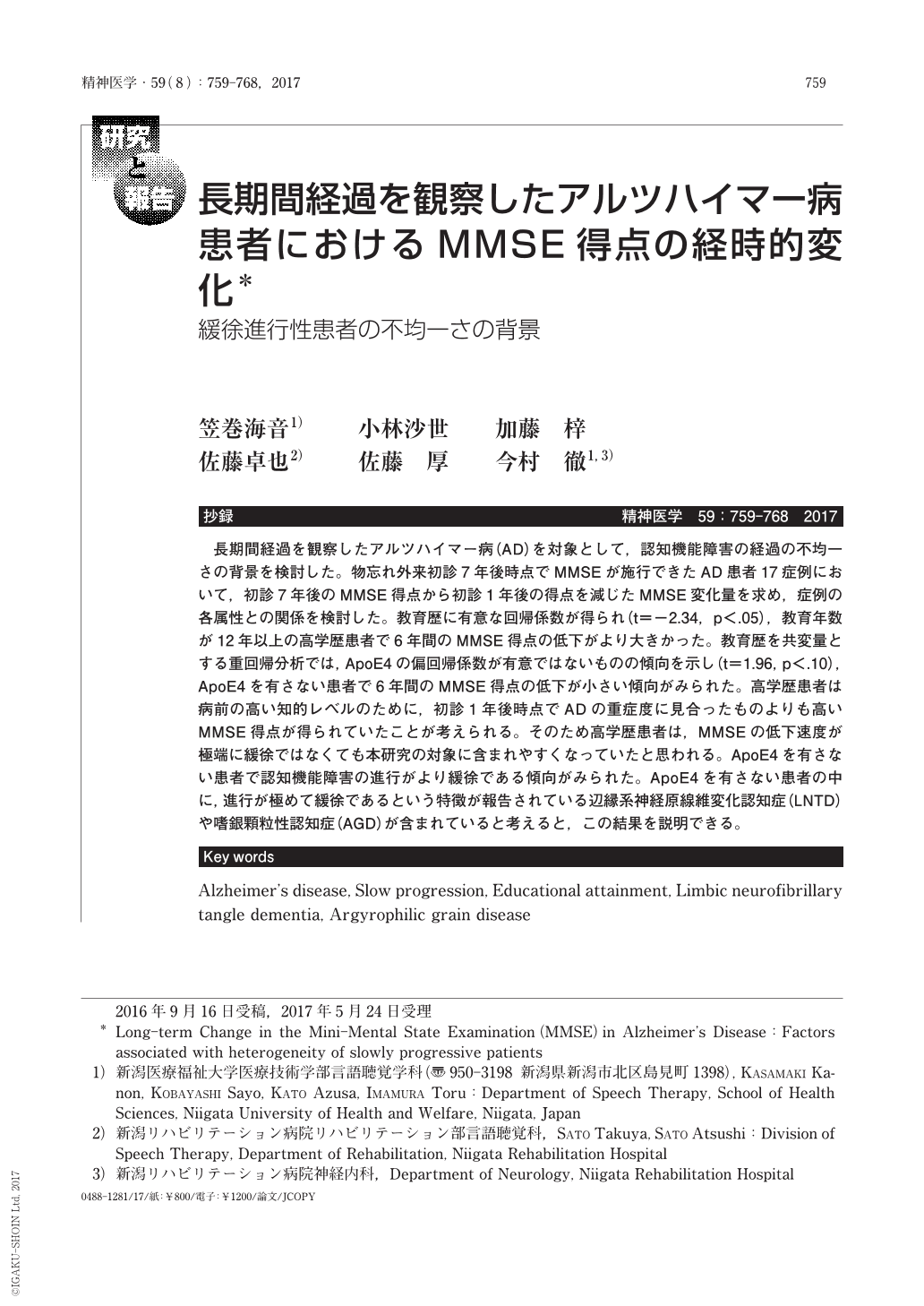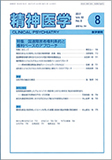Japanese
English
- 有料閲覧
- Abstract 文献概要
- 1ページ目 Look Inside
- 参考文献 Reference
抄録
長期間経過を観察したアルツハイマー病(AD)を対象として,認知機能障害の経過の不均一さの背景を検討した。物忘れ外来初診7年後時点でMMSEが施行できたAD患者17症例において,初診7年後のMMSE得点から初診1年後の得点を減じたMMSE変化量を求め,症例の各属性との関係を検討した。教育歴に有意な回帰係数が得られ(t=−2.34,p<.05),教育年数が12年以上の高学歴患者で6年間のMMSE得点の低下がより大きかった。教育歴を共変量とする重回帰分析では,ApoE4の偏回帰係数が有意ではないものの傾向を示し(t=1.96,p<.10),ApoE4を有さない患者で6年間のMMSE得点の低下が小さい傾向がみられた。高学歴患者は病前の高い知的レベルのために,初診1年後時点でADの重症度に見合ったものよりも高いMMSE得点が得られていたことが考えられる。そのため高学歴患者は,MMSEの低下速度が極端に緩徐ではなくても本研究の対象に含まれやすくなっていたと思われる。ApoE4を有さない患者で認知機能障害の進行がより緩徐である傾向がみられた。ApoE4を有さない患者の中に,進行が極めて緩徐であるという特徴が報告されている辺縁系神経原線維変化認知症(LNTD)や嗜銀顆粒性認知症(AGD)が含まれていると考えると,この結果を説明できる。
Objective:To investigate the factors that are associated with heterogeneity in the clinical course of cognitive impairment in Alzheimer's disease(AD)patients who had slowly-progressive cognitive impairment and were able to receive in-home care for a long term. Subjects:From the clinical database of the memory clinic at our hospital, we extracted 17 AD patients who were under in-home care and were able to undergo assessment with the Mini-Mental State Examination(MMSE)at the time of 7 years after the first consultation. Methods:As an index of change in cognitive impairment in each patient, we calculated the change in MMSE scores between 7 years and 1 year after the first consultation. We analyzed the changes by regression analysis with changes in MMSE scores as a dependent variable and each of patient characteristics as an independent variable. Results:In simple regression analysis, regression coefficient for educational attainment was significant(t=−2.34, p<0.05). Decrease in MMSE scores for 6 years were significantly larger in patients with 12 or more years of education. In multiple regression analysis with educational attainment as a covariate, decrease in MMSE scores for 6 years tended to be smaller in patients without ApoE4, although the partial regression coefficient was not significant(t=1.96, p<0.10). Discussion:In this study, highly-educated patients showed a larger decrease in MMSE scores. This may be because high level of premorbid intelligence of highly-educated patients resulted in a better MMSE score than that corresponding to the severity of their disease at 1 year after the first consultation. Therefore, highly-educated patients probably had a trend to be followed up with MMSE for a longer period and to be included in this research even if their progression was not very slow. ApoE4 accelerates the pathological process of AD and gives the onset at an earlier age. In this study, patients without ApoE4 tended to have a smaller decrease in MMSE scores for 6 years. The result suggests that some of the patients without ApoE4 whose disease was slowly progressive may have disease other than AD, such as limbic neurofibrillary tangle dementia(LNTD)and argyrophilic grain disease(AGD).

Copyright © 2017, Igaku-Shoin Ltd. All rights reserved.


